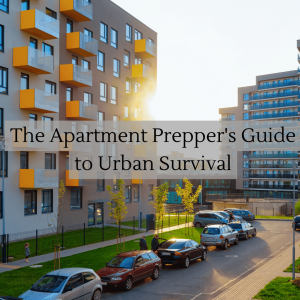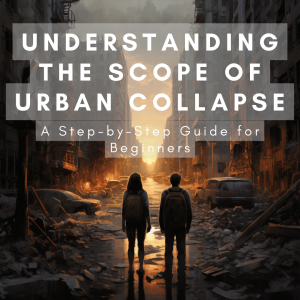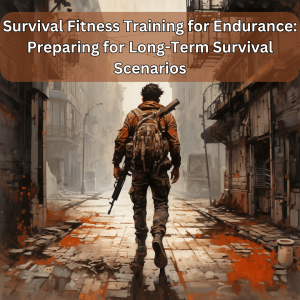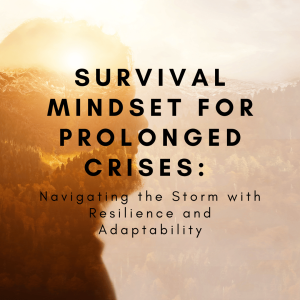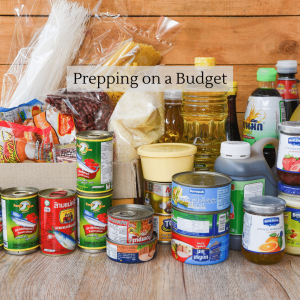In the face of prolonged crises, whether they are natural disasters, economic downturns, global pandemics, or other unforeseen challenges, human beings have an innate ability to adapt and survive. Throughout history, we have encountered countless instances of individuals and communities enduring difficult times and emerging stronger on the other side. However, thriving during prolonged crises requires more than just physical preparedness; it demands a survival mindset that encompasses mental resilience, emotional strength, and strategic thinking. In this article, we delve into the essential components of a survival mindset and explore how one can cultivate it to navigate the storm with resilience and adaptability.
The Nature of Prolonged Crises: Challenges and Opportunities
Prolonged crises test our mettle and push us to our limits. They bring uncertainty, fear, and disruption to the forefront of our lives. Such situations may last for weeks, months, or even years, requiring a profound shift in our perspective and approach to life. The prolonged nature of these crises often leads to a transformation of societies, economies, and individuals alike.
While crises present significant challenges, they also offer unique opportunities for growth and development. It is during these trying times that humanity’s true character is revealed. Individuals and communities have the chance to come together, showcase resilience, and rebuild their lives with newfound strength and determination.
Cultivating a Survival Mindset: The Essential Components
- Embrace Adaptability: One of the most critical components of a survival mindset is the ability to adapt to ever-changing circumstances. Crises are unpredictable, and clinging to old habits and routines might not serve us well. Embracing adaptability means being open to change, letting go of what no longer serves us, and finding new ways to tackle challenges as they arise.
- Maintain a Positive Outlook: Positivity is not about denying the severity of a crisis but rather about approaching it with optimism and hope. A positive outlook enables individuals to maintain mental clarity, focus on solutions, and support others during difficult times. It helps to shift the narrative from “Why is this happening to me?” to “How can I overcome this challenge?”
- Build Resilience: Resilience is the capacity to bounce back after adversity. It involves acknowledging our emotions and experiences without letting them consume us. Building resilience requires self-compassion, a support network, and the willingness to learn from setbacks. By adapting and growing stronger through hardship, we become better equipped to handle future challenges.
- Develop a Growth Mindset: A growth mindset involves believing that our abilities can be developed through dedication and hard work. This perspective enables individuals to view challenges as opportunities for learning and growth. Embracing a growth mindset empowers us to see the silver lining in crises and encourages innovation in finding solutions.
- Prioritize Preparedness: While crises are often unexpected, preparing for potential emergencies can significantly improve our ability to cope with prolonged challenges. Preparedness includes having essential supplies, knowledge, and skills that may be useful during difficult times. It also involves creating contingency plans and building a supportive network.
- Practice Self-Reliance: In a prolonged crisis, external support systems may become limited. Cultivating self-reliance means developing essential survival skills, being resourceful, and understanding how to meet one’s basic needs independently. While communities play a crucial role in supporting each other, being self-reliant enhances our capacity to endure challenging situations.
- Seek Connection and Community: Human beings are social creatures, and a strong sense of community can be a lifeline during prolonged crises. Building connections and supporting others fosters a collective resilience that can help individuals navigate challenging circumstances with a stronger sense of unity.
- Stay Informed and Discerning: During crises, information can be overwhelming, and misinformation can spread rapidly. Developing a discerning mindset involves seeking reliable sources of information, fact-checking, and critically analyzing news and updates. Being informed empowers individuals to make well-informed decisions for themselves and their communities.
Prolonged crises can feel like an endless storm, but with a survival mindset, we can weather even the most formidable challenges. Embracing adaptability, maintaining positivity, building resilience, and developing a growth mindset are essential components that enable us to thrive amidst uncertainty. Prioritizing preparedness, self-reliance, and seeking connections with others further strengthens our capacity to navigate through prolonged crises.
Remember that a survival mindset is not about merely enduring hardship, but rather about embracing the opportunity to grow, learn, and emerge from the storm with newfound strength and wisdom. By cultivating this mindset individually and collectively, we can face any prolonged crisis with resilience and adaptability, knowing that, in the darkest of times, the human spirit can shine its brightest.
